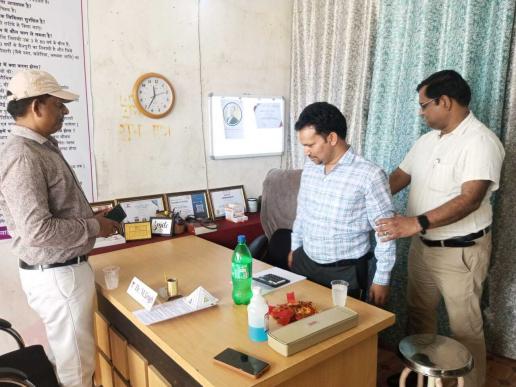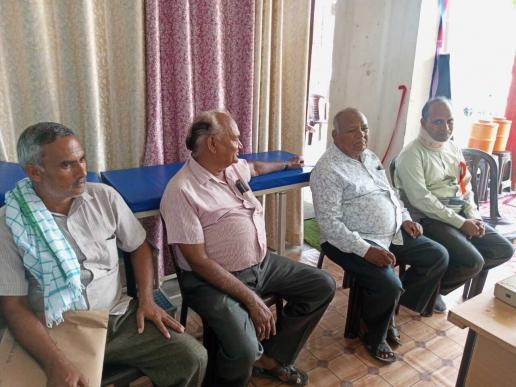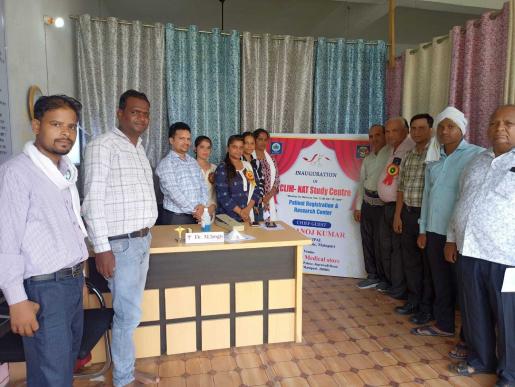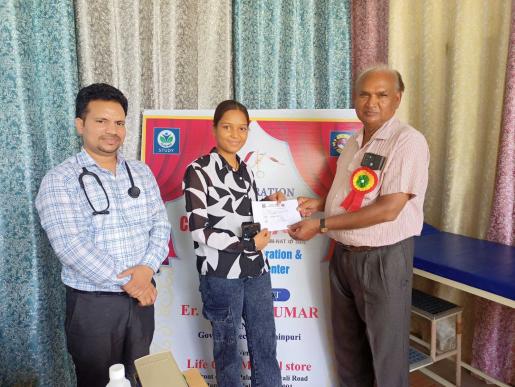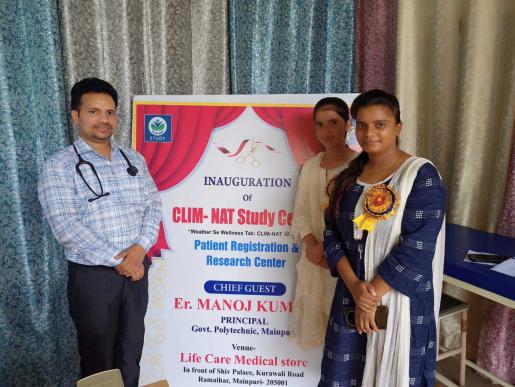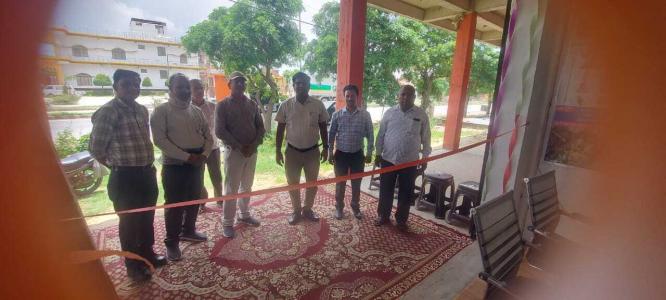CLIM‐NAT Study (Research)
🌿Weather Se Wellness Tak: CLIM-NAT के साथ🌿
Sir L.S.K. Group of Education & Research Institution
Medical Research
Public Title:
Studying How Weather Changes Affect Health in Rural Areas and Using Low-Cost Natural Methods to Prevent Common Illnesses After Basic Medical Care. (CLIM‐NAT Study).
or
Identifying diseases caused by weather changes in rural areas and exploring the development of latest techniques of prevention and awareness at very low cost through naturopathy after primary treatment through allopathy.
Key Components Included:
- Participants: People living in rural areas
- Exposure: Weather changes
- Main outcomes: Prevention of common illnesses through low-cost naturopathy after initial allopathic treatment
Scientific Title:
Reducing Dependence on NSAIDs and Analgesics in Weather-Related Illnesses: A Multidisciplinary Study on Naturopathy-Based Prevention in Rural Healthcare. (CLIM‐NAT Study).
or
Assessing Climate-Related Health Risks: A Study on Diseases Affected by Weather Changes in Rural Populations and Cost-Effective Naturopathic Interventions Following Allopathic Treatment.
Acronym:
CLIM‐NAT Study
Principal Investigator:
Dr. Mulayam Singh,
Researcher
Room No. 4 (Research Section)
Sir L.S.K. Group Compound,
BL-158/635, Hind Puram Colony, Near B.P. Gurukul Academy, Mainpuri-205001(Uttar Pradesh) India
Email: mulayam099@gmail.com
Phone: 6393372879
Co-Investigators
Scientific Query | Public Query |
Er. Rajjan Babu, Manager, Room No. 1 (Admin Section) Sir L.S.K. Group Compound, BL-158/635, Hind Puram Colony, Near B.P. Gurukul Academy, Mainpuri-205001(Uttar Pradesh) India Email: rajjan.ic.2008@gmail.com, Phone: 8445429838 | Adv. Rajesh Babu, Treasurer, Room No. 1 (B.P. Gurukul Section) Sir L.S.K. Group Compound, BL-158/635, Hind Puram Colony, Near B.P. Gurukul Academy, Mainpuri-205001(Uttar Pradesh) India Email: rajeshbca68@gmail.com, Phone: 9917990075 |
Institution & Address:
Sir L.S.K. Group of Education & Research Institutions
BL-158/635, Hind Puram Colony, Near B.P. Gurukul Academy, Mainpuri, Uttar Pradesh, 205001, India
Funding/Support:
Nil
Date of Submission : 02 June 2025
1. Introduction & Background
Rural areas of Mainpuri district, Uttar Pradesh, experience significant weather fluctuations, including heatwaves during summer, cold spells in winter, and unpredictable monsoon patterns. These changes directly impact agricultural activities and exacerbate health risks among residents aged 3 to 80 years. Agriculture-dependent households, comprising approximately 70% of Mainpuri’s population, often face increased incidence of waterborne diseases, vector-borne infections, respiratory conditions, and dermatological issues in response to seasonal extremes.
Primary healthcare in Mainpuri relies on Allopathic treatment provided at the District Hospital, Community Health Centers (CHCs), Primary Health Centers (PHCs), and periodic health camps across all 800 villages. However, despite initial allopathic management, there remains a high rate of disease recurrence, partly due to lack of access to sustained preventive measures, economic constraints, and limited health literacy. Therefore, integrating low-cost Naturopathy-based preventive strategies post-allopathic treatment may fill this gap and reduce disease burden.
Study Aim:
This study aims to identify the spectrum of weather-linked diseases in Mainpuri’s rural population, assess the effectiveness of allopathic primary treatment, and develop cost-effective naturopathy interventions (yoga, herbal decoctions, dietary modifications, and lifestyle counseling) to enhance community awareness and reduce disease recurrence over a three-year period (01 July 2025 – 30 June 2028).
2. Literature Review
Singh et al. (2022) documented a 30% rise in diarrheal illnesses during erratic monsoons in Western Uttar Pradesh.
• Kumar & Verma (2021) reported increased malaria and dengue incidences following prolonged stagnant water accumulation in rural Bihar, indicating similar vulnerabilities for Mainpuri.
• Sharma et al. (2023) observed seasonal peaks in asthma and bronchitis cases during cold waves in rural North India.
• Patel & Joshi (2020) demonstrated a 45% reduction in viral fever symptoms with a regimen of herbal tea (Tulsi, Ashwagandha, Ginger) combined with yoga in rural Vidarbha.
• Gupta et al. (2024) found that Naturopathy interventions post-allopathic treatment reduced recurrence rates by 35% compared to controls.
Despite these findings, comprehensive studies focusing on the full age spectrum (3–80 years) in a single district, with simultaneous data collection from Government District Hospital, CHCs, PHCs, and all 800 villages of Mainpuri, remain lacking. Moreover, no study has developed a unified, low-cost prevention model integrating allopathic and naturopathic approaches at this scale.
3. Study Population & Problem Statement
3.1 Target Population:
Residents aged 3–80 years in Mainpuri district’s 800 villages and service seekers at the Government District Hospital, CHCs, and PHCs.
3.2 Study Duration:
1–3 years ( 01 July 2025 to 30 June 2028).
3.3 Geographic Scope:
All 800 villages of Mainpuri district, Uttar Pradesh, including outreach camps affiliated with District Hospital, CHCs, PHCs.
3.4 Health Conditions Monitored:
- Waterborne diseases: Diarrhea, Cholera
- Vector-borne diseases: Malaria, Dengue
- Respiratory infections: Viral Fever, Asthma
- Dermatological issues: Eczema, Fungal Infections
- Weather-triggered allergies
3.5 Research Problem:
- What is the incidence and seasonal distribution of weather-related diseases among rural Mainpuri residents?
- After primary allopathic treatment, can cost-effective naturopathic measures significantly reduce recurrence rates and improve quality of life?
4. Objectives & Research Questions
Primary Objective:
To identify patterns of weather-related diseases among rural residents of Mainpuri and evaluate the effectiveness of low-cost naturopathic interventions, following allopathic treatment, in reducing disease recurrence.
Secondary Objectives:
- Determine the natural incidence and seasonal trends of weather-linked illnesses.
- Measure six-month recurrence rates after allopathic primary treatment.
- Assess health improvements—such as reduced recurrence and enhanced quality of life—from yoga, herbal decoctions, and dietary guidance.
- Evaluate the effectiveness of various awareness models (village health camps, self-help groups, and Panchayat-led initiatives).
- Formulate policy recommendations to integrate naturopathy into rural health programs.
Research Questions:
- RQ1: Which weather-induced diseases are most prevalent in Mainpuri’s rural population, and how do they distribute seasonally?
- RQ2: What is the comparative recurrence rate between allopathy-only treatment and allopathy-plus-naturopathy intervention?
- RQ3: Which awareness model achieves the highest acceptance and sustainability of naturopathy practices?
Hypotheses:
- H₁: A structured naturopathy package (yoga + herbal decoction + diet) will reduce recurrence rates by at least 30% compared to standard care.
- H₀: The naturopathy package will have no significant effect on recurrence rates.
5. Study Type & Design
Type of Trial : Observational
Type of Study : Follow up Study
• Phase I:
Cross-sectional survey—Record weather-related disease presentations at District Hospital, CHCs, PHCs, and village camps.
- Case Group: Participants diagnosed with weather-related illnesses will receive allopathic primary treatment and then a standardized naturopathy intervention.
- Control Group: Age-, gender-, and village-matched participants will receive only allopathic primary treatment without any additional naturopathy intervention.
- Phase II:
Prospective cohort—Enroll 600 patients
- Children : 3 –17 = 200;
- Adults : 18–80 = 400
receiving allopathic treatment, then follow up two groups:
– Group A (Control): Standard allopathic follow-up only.
– Group B (Intervention): Allopathic treatment + Naturopathy package.
Study Design : Other (Non-randomized parallel-group trial with blinded outcome assessment. Participants receive group assignment by convenience sampling. Outcome assessors and data analysts remain blinded to group allocation.)
Data Collection Sites:
- Government District Hospital, Mainpuri
- All Community Health Centers (CHCs) and Primary Health Centers (PHCs) in Mainpuri district
- Periodic outreach camps in every one of the 800 villages
Blinding:
Outcome assessors will be blinded to whether participants belong to the case or control group.
6. Inclusion & Exclusion Criteria
Inclusion Criteria:
- Age 3–80 years.
- Resident of Mainpuri district for at least three years.
- Diagnosed with a weather-related illness (e.g., diarrhea, malaria, viral fever, asthma) between 01 July 2025 and 30 June 2028.
- Willing to provide written informed consent (guardian consent required for minors).
- Available for follow-up throughout the study duration.
Exclusion Criteria:
- Severe comorbidities (heart failure NYHA III/IV, renal failure with creatinine > 2.0 mg/dL).
- Psychiatric disorders that would impede compliance.
- Pregnant or breastfeeding women.
- Received any naturopathic intervention within the past six months.
- Enrolled in any other clinical trial during the study period.
7. Sample Size & Recruitment
Target Sample Size:
600 participants (300 in each group).
Sample Size Calculation:
- Based on pilot data indicating:
- Recurrence rate in control (Allopathic only): ~40%
- Recurrence rate in intervention (Allopathic + Naturopathy): ~20%
- α = 0.05, β = 0.20 (power = 80%) - Minimum 246 participants per group; adjusted to 300 per group to account for 20% drop-out.
Recruitment Sites:
- Government District Hospital, Mainpuri
- All CHCs and PHCs across Mainpuri district
- Outreach health camps in all 800 villages
Recruitment Process/Strategy:
- Case Selection/Screening: Any patient aged 3–80 presenting with a weather-related illness between 01July 2025 and 30 June 2028 will be screened and, if eligible, invited to participate as a case.
- Control Selection: Matched participants (same village, similar age and gender) who visit the health facilities for non-weather-related conditions will be recruited as controls.
- Enrollment: Assign a unique ID, record baseline demographics, clinical data, and group assignment.
- First Enrollment Date: 01 July 2025
- Recruitment Status at Commencement: Not Yet Recruiting
8. Outcomes
Primary Outcomes:
- Recurrence of the same weather-related disease within six months post-treatment (case versus control), measured through clinical evaluation and patient self-report.
- Quality of Life (QoL) measured by WHOQOL-BREF at baseline and 6 months.
Secondary Outcomes:
- Incidence of new weather-related illnesses during follow-up.
- Average monthly healthcare expenditure per participant (Allopathic + Naturopathy costs).
- Change in Health Awareness (KAP score) from baseline to 6 months.
- Adverse Events related to interventions.
- 6-month hospital readmission rates.
- Quality of Life (QoL) assessed by WHOQOL-BREF at baseline, 6 months, 12 months.
9. Ethics & Regulatory Approval
Institutional Ethics Committee:
- IEC Name : Sir L.S.K. Group of Education & Research Institutions
- Approval Date: March 20, 2025
- IEC Ref: 455/IEC/Research/2024-25/Mainpuri
Regulatory Clearance:
- DCGI: Not Applicable
- AYUSH Approval: Not Applicable
Individual Participant Data (IPD) Sharing Statement:
Individual participant data will not be shared publicly.
10. Methodology
10.1 Study Procedures
- Screening Visit (Day 0):
- Record demographic details, vital signs (BP, pulse, temperature).
- Obtain laboratory investigations (CBC, RFT, LFT, malaria smear, viral markers).
- Allopathic Primary Treatment (Day 1–7):
- Prescribe medications according to the clinical diagnosis (e.g., antibiotics, antimalarials, antivirals).
- Monitor clinical response on Day 3 and Day 7.
- Group Assignment (Day 8):
- Case Group: Continue standard allopathic care and initiate the Naturopathy Package.
- Control Group: Continue standard allopathic care only (no naturopathy).
- Naturopathy Package Components (for Case Group):
- Yoga: Five days per week, 30 minutes per session, supervised by a local instructor.
- Herbal Decoction: Morning and evening (Tulsi, Ashwagandha, Ginger – 10 g each, boiled in 250 mL water).
- Dietary Guidance: Seasonal local vegetables, legumes, whole grains, use of mustard oil, and emphasis on adequate hydration.
- Lifestyle Counseling:
- Personal hygiene measures
- Home-based water purification (boiling or filtration)
- Dust prevention
- Avoidance of tobacco and alcohol
- Follow-Up Visits:
- Month 1, Month 3, Month 6, Month 12, Month 24, Month 36
- Assess clinical status, record any disease recurrence or emergence of new illnesses.
- Repeat laboratory tests as indicated.
- Administer WHOQOL-BREF and KAP questionnaire.
- Record adverse events and hospital readmissions.
- Data Management:
- Use REDCap for electronic data capture.
- Employ standardized Case Report Forms (CRFs) for baseline and follow-up data.
- Quality Control Measures: Double data entry, periodic audits, secure password-protected storage, daily backups.
10.2 Data Collection Tools
- Case Report Form (CRF): Captures baseline demographics, clinical data, intervention details, and follow-up outcomes.
- Health Awareness Questionnaire (KAP): A 20-item survey assessing knowledge, attitude, and practices regarding weather-related diseases and preventive measures.
10.3 Statistical Analysis
- Data Cleaning: Identify missing values, outliers, and ensure data consistency.
- Descriptive Statistics:
- Continuous variables: Mean ± Standard Deviation (SD)
- Categorical variables: Frequencies (%)
- Visualize seasonal incidence with bar charts.
- Inferential Analysis:
- Recurrence Rates: Chi-square (χ²) test comparing case versus control.
- Quality of Life (QoL) Scores:
- Paired t-test for within-group changes (baseline vs. follow-up)
- Independent t-test for between-group comparisons (cases vs. controls)
- Incidence of New Illnesses: Calculate Risk Ratio (RR).
- Healthcare Expenditure: Mann–Whitney U test if costs are not normally distributed.
- KAP Score Changes: Wilcoxon Signed-Rank test for within-group comparisons.
- Multivariate Analysis:
- Logistic regression to identify predictors of recurrence.
- Cox Proportional Hazards model for time-to-recurrence analysis.
Sample Seasonal Incidence Table
S. No. | Season | Disease | Incidence Rate (%) |
1 | Summer | Diarrhea | 25 |
2 | Monsoon | Malaria | 18 |
3 | Winter | Asthma | 15 |
11. Timeline
S. No. | Phase | Duration | Dates |
1 | Protocol Preparation & Submission | 02 months | April 2025 – May 2025 |
2 | Ethics & Regulatory Approvals | 01 month | June 2025 |
3 | Enrollment & Baseline Assessments | 06 months | July 2025 – December 2025 |
4 | Intervention & Follow-Up (up to 36 months) | 36 months | January 2026 – December 2028 |
5 | Data Analysis & Report Writing | 03 months | January 2029 – March 2029 |
6 | Final Report & Dissemination | 01 month | April 2029 |
12. Expected Outcomes & Significance
Clinical Impact:
- Enhanced preparedness of Mainpuri’s rural health infrastructure to tackle weather-related diseases.
- Demonstration of a ≥ 30% reduction in recurrence rates among cases receiving naturopathy, leading to decreased long-term healthcare costs.
Scientific Novelty:
- The first large-scale case–control study in Mainpuri district covering ages 3–80 and integrating data from district hospitals, CHCs, PHCs, and all 800 villages.
- Development of a scalable, low-cost prevention model suitable for replication in similar rural settings.
Socioeconomic Relevance:
- Reduced out-of-pocket expenditure for rural families.
- Improved community health literacy and adoption of hygiene practices, yoga, and herbal remedies.
- Policy recommendations for integrating naturopathy into state health programs to mitigate climate-related health risks.
13. References
- Gupta, R., Sharma, P., & Joshi, V. (2024). Effectiveness of Naturopathy Combined with Allopathic Treatment in Reducing Recurrence of Seasonal Diseases in Rural Maharashtra. Journal of Integrative Medicine, 12(3), 145–153.
- Kumar, S., & Verma, A. (2021). Impact of Unusual Rainfall Patterns on the Incidence of Malaria and Dengue in Rural Bihar. International Journal of Public Health, 15(2), 78–85.
- Patel, M., & Joshi, T. (2020). Herbal Tea and Yogic Practices for Viral Fever Management in Rural Vidarbha: A Quasi-Experimental Study. Ayurveda & Naturopathy Research, 8(1), 22–29.
- Sharma, L., Singh, K., & Yadav, S. (2023). Association Between Cold Waves and Respiratory Morbidity in Rural Northern India. Indian Journal of Community Medicine, 48(4), 212–218.
- World Health Organization. (2022). Climate Change and Health: Key Facts and Figures. WHO Press.
- Ministry of Health & Family Welfare, Government of India. (2023). National Health Profile 2023. Central Bureau of Health Intelligence.
- National Institute of Naturopathy. (2021). Guidelines for Integrating Naturopathy Practices in Primary Healthcare Centers.
14. Annexures
14.1 Informed Consent Form (ICF):
– Copies in Hindi and English.
14.2 Sample Case Report Form (CRF).
14.3 Ethics Committee Approval Letter.
14.4 AYUSH Approval Document for Herbal Decoction Protocol.
14.5 Yoga Protocol Details:
– List of asanas, pranayamas, meditation sessions (Duration, Frequency, Supervision).
14.6 Herbal Decoction Recipe:
– Ingredients: Tulsi, Ashwagandha, Ginger (10 g each); preparation and administration instructions.
14.7 Nutritional Diet Chart:
– Seasonal vegetables, legumes, whole grains, mustard oil usage, hydration guidelines.
14.8 Lifestyle Counseling Materials:
– Personal hygiene guidelines, home water purification methods, dust prevention measures, tobacco and alcohol avoidance strategies.
14.9 Village Maps & Meteorological Data Charts:
– Detailed maps of all 800 villages of Mainpuri district and historical temperature, rainfall, and humidity charts for the past three years.
प्रेस विज्ञप्ति
शीर्षक 1. :- मौसमी बीमरियों में प्राकृतिक चिकित्सा हस्तक्षेपों पर अब मैनपुरी में भी होगा शोध कार्य |
- :- लाइफ केयर मेडिकल स्टोर पर शोध पंजीकरण केंद्र का हुआ उद्घाटन |
आज दिनांक – 02.07.2025 प्रातः 11:00 बजे, लाइफ केयर मेडिकल स्टोर, शिव पैलेश के ठीक सामने, निकट ग्राम रमैहार, कुरावली रोड, मैनपुरी पर शोध पंजीकरण केंद्र का उद्घाटन मुख्य अतिधि इंजी. मनोज कुमार, प्रधानाचार्य, राजकीय पॉलिटेक्निक, आगरा रोड, मैनपुरी द्वारा किया गया | इसका सञ्चालन मुख्य अन्वेषक डॉ. मुलायम सिंह के नेतृत्व में सर एल.एस.के. ग्रुप ऑफ एजुकेशन एण्ड रिसर्च इंस्टीट्यूशन्स, मैनपुरी के तत्वावधान में में किया जायेगा | यह एक अत्यंत महत्वपूर्ण एवं जनहितकारी बहु-विषयक स्वास्थ्य अनुसंधान परियोजना "CLIM-NAT Study" जिसका उद्देश्य “ मौसम परिवर्तन के कारण ग्रामीण क्षेत्रों में होने वाली विभिन्न बीमारियों में एलोपेथिक प्राथमिक उपचार के उपरांत नैचुरोपैथी आधारित (योग, हर्बल काढ़ा, पोषणीय आहार एवं जीवनशैली परामर्श) हस्तक्षेपों की प्रभावकारिता का वैज्ञानिक मूल्यांकन कर बीमारियों की पुनरावृत्ति को न्यूनतम करना है | जिससे हमारा समाज शारीरिक, मानसिक एवं आर्थिक रूप से मजबूत बन सके | यह अध्ययन सीटीआरआई (क्लिनिकल ट्रायल रजिस्ट्री – इंडिया) द्वारा पंजीकृत किया गया है |
आज के कार्यक्रम के मुख्य अतिथि इंजी. मनोज कुमार, प्रधानाचार्य, राजकीय पॉलिटेक्निक, मैनपुरी विशिष्ट अतिथि इंजी. अजय यादव, राजकीय पॉलिटेक्निक, मैनपुरी, श्री सुरेश चन्द्र शाक्य, पूर्व अनुदेशक, राजकीय पॉलिटेक्निक, मैनपुरी एवं अन्य अतिथि / गणमान्य व्यक्ति इंजी. रज्जन बाबू, प्रबंध निदेशक, सर एल.एस.के. ग्रुप, मैनपुरी, श्री राजेश बाबू, प्रधानाचार्य, बी.पी. गुरुकुल एकेडमी, मैनपुरी, श्री वीरेंद्र पाल सिंह, समाज सेवक, डॉ. मुलायम सिंह मुख्या अन्वेषक, श्री दिलीप बाबू, प्रोजेक्ट कोर्डिनेटर,नितीश कुमार, डूडा विभाग की उपस्थिति में जन जागरूकता शिविर व पंजीकरण केंद्र उद्घाटन समारोह का आयोजन कर प्रतिभागियों का पंजीकरण किया गया और उन्हें शोध की बारीकियों के बारे में बताया गया | कार्यक्रम का शुभारम्भ स्वागत समारोह से किया गया | जिसमें शिविर में उपस्थित सभी अतिथियों / गणमान्य व्यक्तियों एवं कार्यक्रम सञ्चालन टीम के सदस्यों के बैच लगाये गए | डॉ. मुलायम सिंह, मुख्य अन्वेषक द्वारा मुख्य अतिथि के बैच लगाकर उनका स्वागत किया गया एवं अन्य अतिथियों व टीम के सदस्यों के श्री दिलीप बाबू, प्रोजेक्ट कोर्डिनेटर एवं रोहित बाबू, कुमारी पूजा, कुमारी खुशबू (शालू) द्वारा बैच लगाकर उनका स्वागत किया गया | इसके उपरांत विधिवत कार्यक्रम का सञ्चालन किया गया | जिसमें सभी उपस्थित वक्ताओं द्वारा अपने – अपने वक्तव्य दिये गए व टीम के सदस्यों प्रशिक्षण की जानकारी व पहचान पत्र विशिष्ट अतिथि सुरेश चन्द्र शाक्य द्वारा श्री सुखवीर सिंह, ग्राम अलूपुर कुरावली , कु. श्रृष्टि पालीवाल, संसारपुर, कु. गूंजा नगला पजाबा व अन्य को वितरित किये गए | इस अवसर पर रेनू बाबू, सुहावनी, विनोद कुमार एवं स्थानीय निवासी उपस्थित रहे |
🔷 मुख्य वक्ताओं के विचार:
👉 Er. मनोज कुमार ने अपने संबोधन में कहा,
"स्वस्थ समाज की नींव शिक्षित और जागरूक नागरिक होते हैं। CLIM-NAT Study ग्रामीण विकास व चिकित्सा शोध के समन्वय का श्रेष्ठ उदाहरण है। इसे जन-आंदोलन बनाना हम सभी की ज़िम्मेदारी है।” साथ ही उन्होंने अध्ययन के सञ्चालन हेतु अति महत्वपर्ण सुझाव भी दिए |
👉 Er. रज्जन बाबू, प्रबंधक एवं वैज्ञानिक संयोजक, ने कहा,
"यह केंद्र उपचार के साथ-साथ रोकथाम का मार्ग प्रशस्त करेगा। 800 गाँवों में पहुंच बनाकर हम यह सिद्ध करेंगे कि सरल उपायों से भी बड़ी समस्या को हल किया जा सकता है।" साथ ही उन्होंने मैनपुरी जनपद के प्रत्येक ग्रामवासी छात्र/छात्रों से अनुरोध किया के वे इस कार्यक्रम में स्वयसेवक बनकर समाजहित में अपनी सेवाए देकर देश व समाजहित में अपना भावी योगदान प्रदान करें | उन्होंने कहा की स्वयंसेवक बनाए हेतु लाइफ केयर मेडिकल स्टोर या मुख्य संस्था कार्यालय पर संपर्क किया जा सकता है |
👉 Dr. मुलायम सिंह, प्रमुख शोधकर्ता, ने बताया,
"हम तीन वर्षों में 600 प्रतिभागियों के डेटा के माध्यम से साबित करेंगे कि एलोपैथिक उपचार के बाद नैचुरोपैथी अपनाकर पुनरावृत्ति में 30% की कमी लायी जा सकती है। यह वैज्ञानिक और नीति दोनों स्तर पर क्रांतिकारी साबित होगा।"
📌 CLIM-NAT Study के अंतर्गत यह केंद्र एक मॉडल रिसर्च हब के रूप में विकसित किया जाएगा, जिससे भविष्य में नीति निर्माण में सहायता मिलेगी।
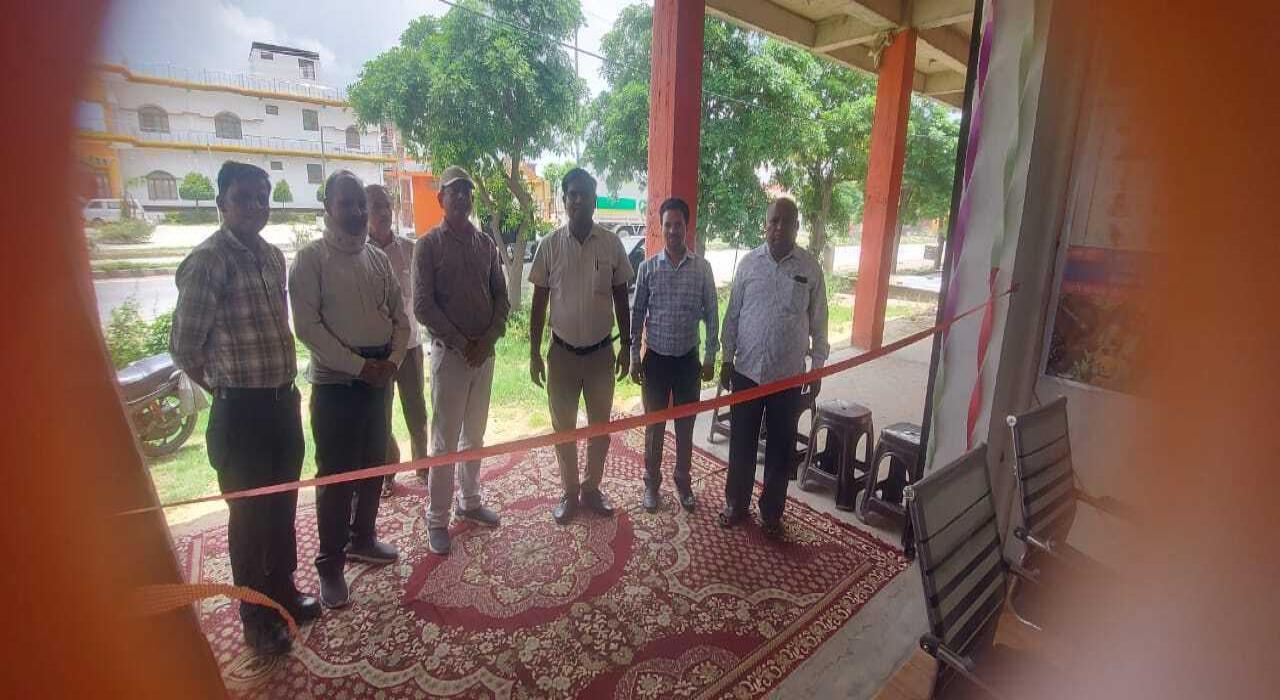
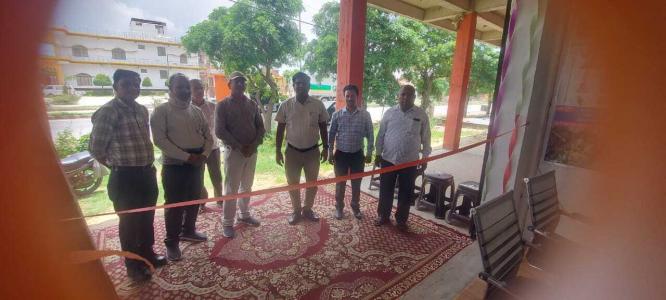
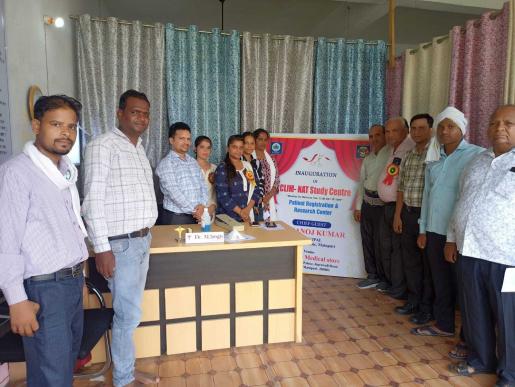
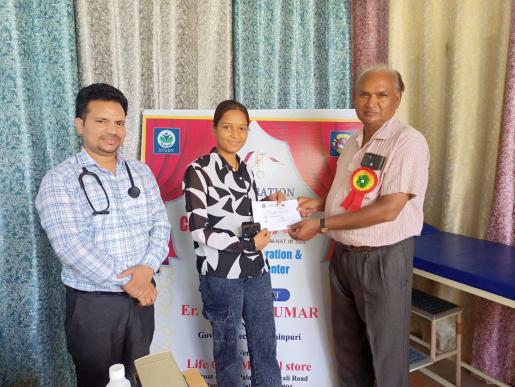
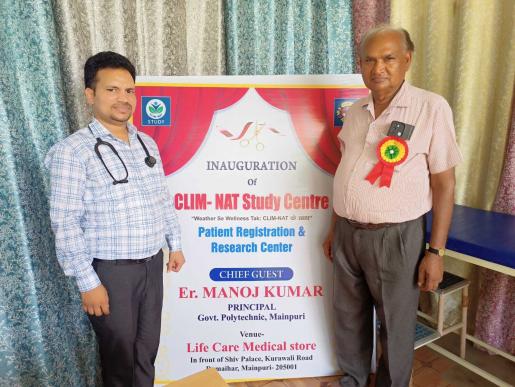
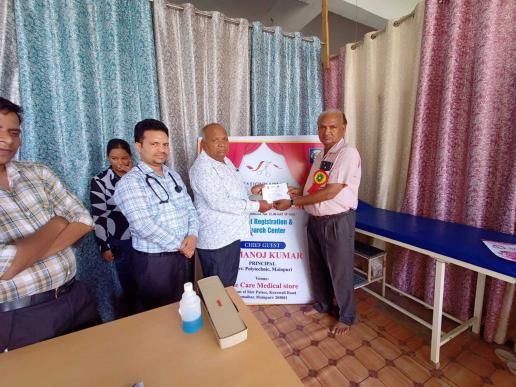
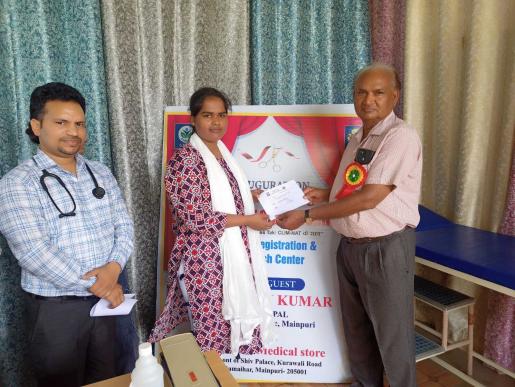
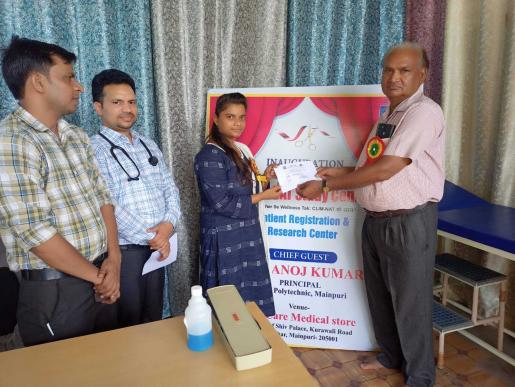
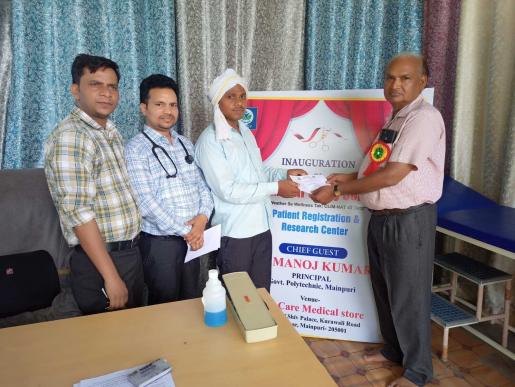
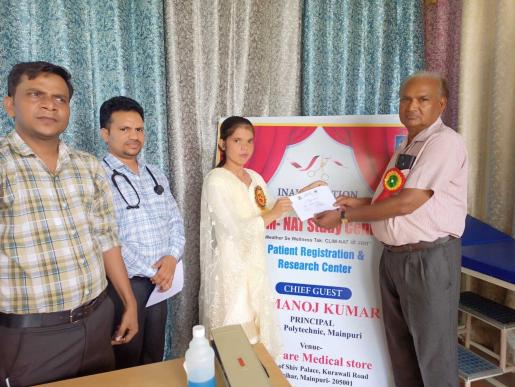
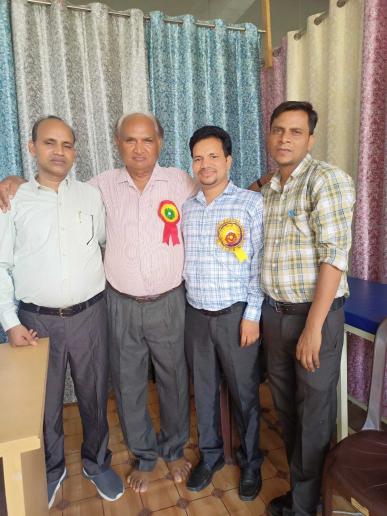
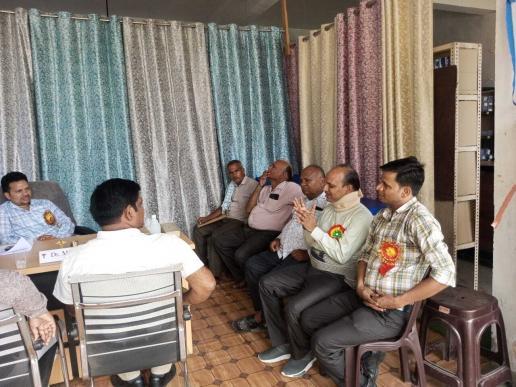
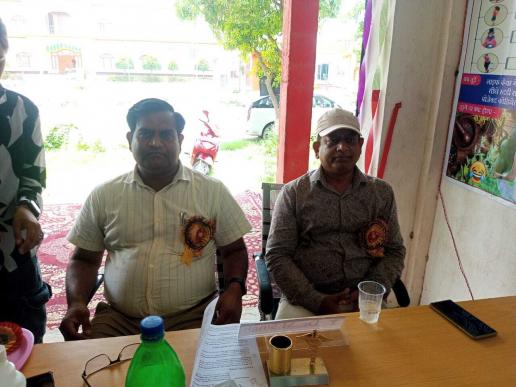
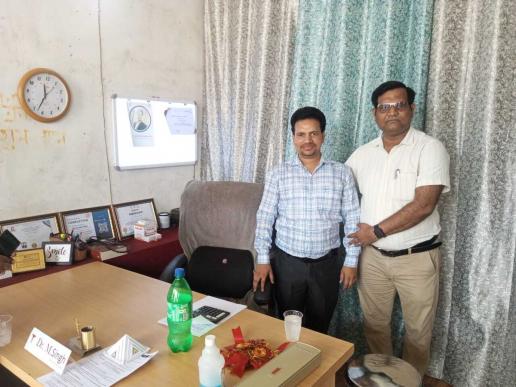
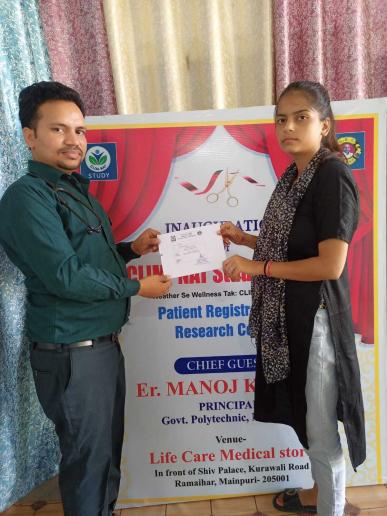
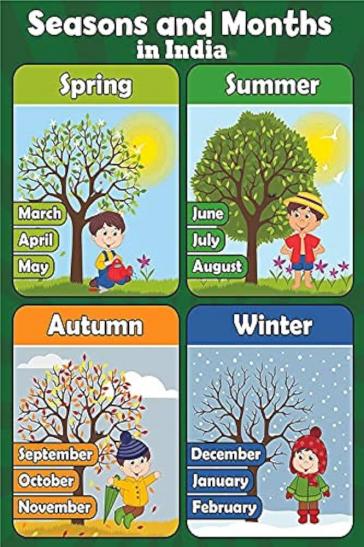
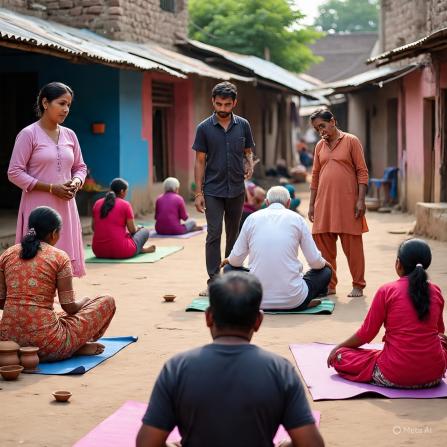
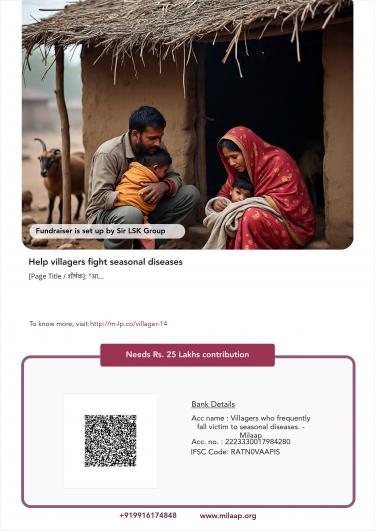
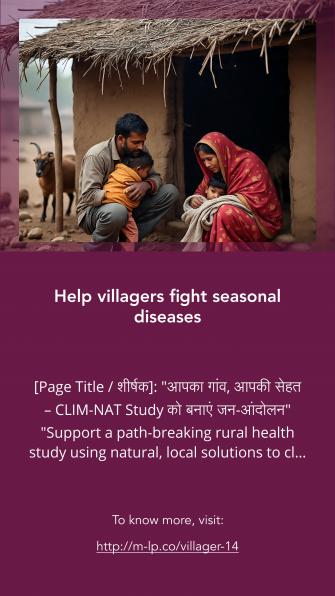
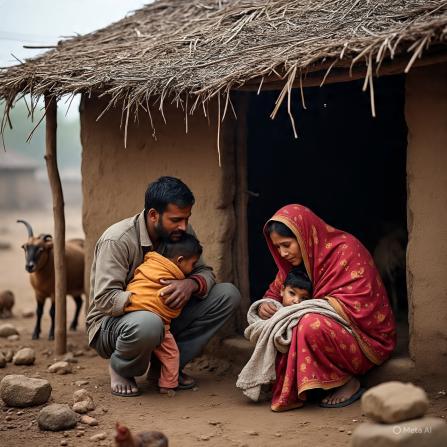
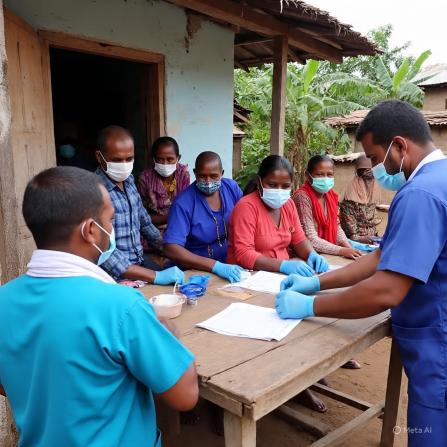
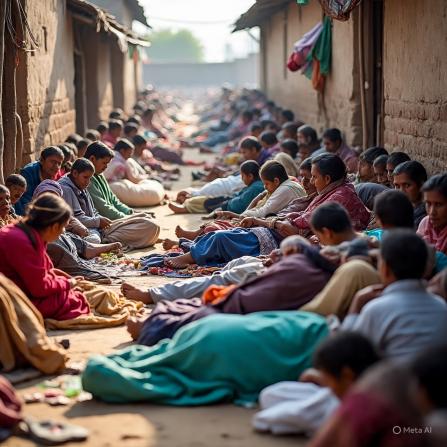
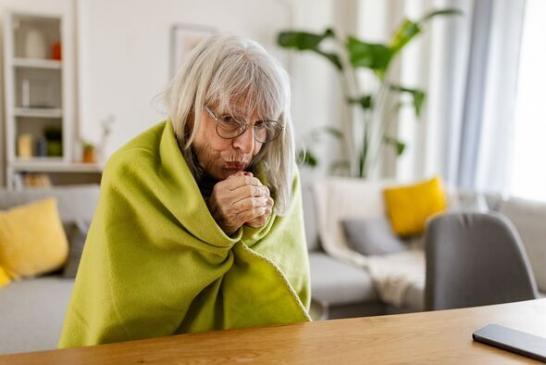
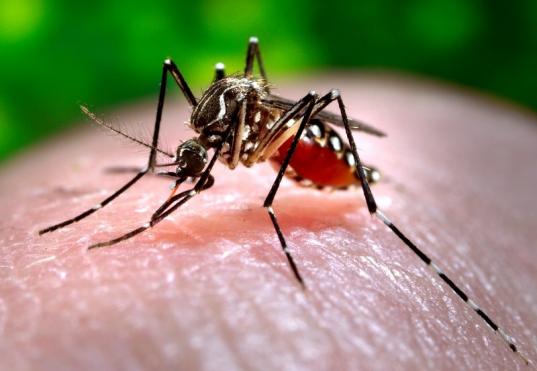


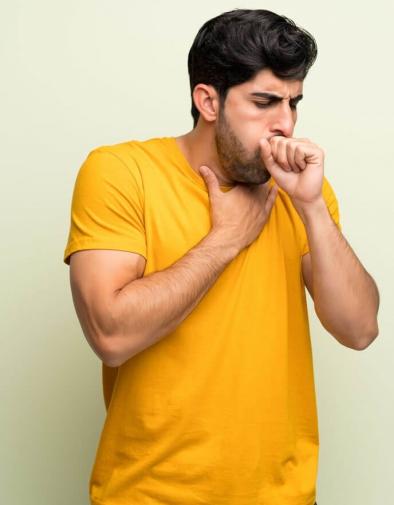


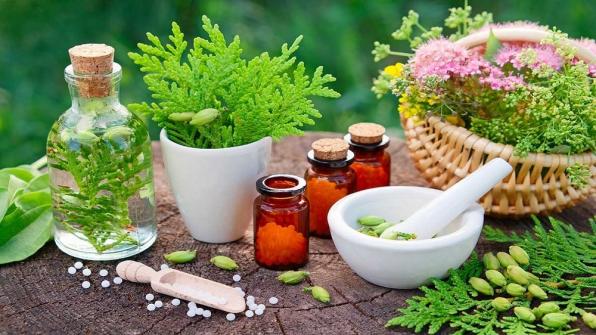
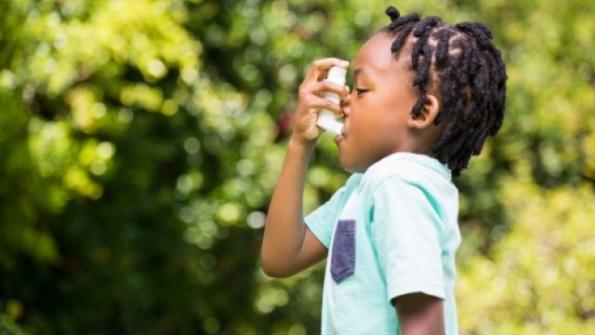


छात्रवृत्ति योजना
भारत देश की केंद्र सरकार ने देश में शिक्षा का स्तर सुधारने के लिए कई प्रधानमंत्री छात्रवृत्ति योजना लागु की हैं . भारत देश में कई तरह की छात्रवृत्ति योजना चलती है, जिसके अंदर अलग-अलग लाभ अलग-अलग लाभार्थी को दिए जाते है. सरकार इसमें ऐसे विद्यार्थियों का चयन करती है जो मेरिट में आये है, और जिनकी आर्थिक स्थिति मजबूत नहीं है. योजना के अंतर्गत मिलने वाली वित्तीय सहायता और योजना की पूरी निगरानी केन्द्रीय सरकार द्वारा की जाती है.....Read more

छात्रवृत्ति योजना
भारत देश की केंद्र सरकार ने देश में शिक्षा का स्तर सुधारने के लिए कई प्रधानमंत्री छात्रवृत्ति योजना लागु की हैं . भारत देश में कई तरह की छात्रवृत्ति योजना चलती है, जिसके अंदर अलग-अलग लाभ अलग-अलग लाभार्थी को दिए जाते है. सरकार इसमें ऐसे विद्यार्थियों का चयन करती है जो मेरिट में आये है, और जिनकी आर्थिक स्थिति मजबूत नहीं है. योजना के अंतर्गत मिलने वाली वित्तीय सहायता और योजना की पूरी निगरानी केन्द्रीय सरकार द्वारा की जाती है.....Read more

छात्रवृत्ति योजना
भारत देश की केंद्र सरकार ने देश में शिक्षा का स्तर सुधारने के लिए कई प्रधानमंत्री छात्रवृत्ति योजना लागु की हैं . भारत देश में कई तरह की छात्रवृत्ति योजना चलती है, जिसके अंदर अलग-अलग लाभ अलग-अलग लाभार्थी को दिए जाते है. सरकार इसमें ऐसे विद्यार्थियों का चयन करती है जो मेरिट में आये है, और जिनकी आर्थिक स्थिति मजबूत नहीं है. योजना के अंतर्गत मिलने वाली वित्तीय सहायता और योजना की पूरी निगरानी केन्द्रीय सरकार द्वारा की जाती है.....Read more

छात्रवृत्ति योजना
भारत देश की केंद्र सरकार ने देश में शिक्षा का स्तर सुधारने के लिए कई प्रधानमंत्री छात्रवृत्ति योजना लागु की हैं . भारत देश में कई तरह की छात्रवृत्ति योजना चलती है, जिसके अंदर अलग-अलग लाभ अलग-अलग लाभार्थी को दिए जाते है. सरकार इसमें ऐसे विद्यार्थियों का चयन करती है जो मेरिट में आये है, और जिनकी आर्थिक स्थिति मजबूत नहीं है. योजना के अंतर्गत मिलने वाली वित्तीय सहायता और योजना की पूरी निगरानी केन्द्रीय सरकार द्वारा की जाती है.....Read more
सिमर्स इंस्टिट्यूट के अंतर्गत प्रमुख योजनाएं
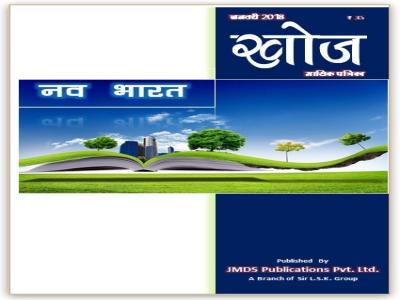
खोज मासिक पत्रिका
प्रसिद्ध गीतकार तनवीर ग़ाज़ी ने लिखा है -
"तू खुद की खोज में निकल
तू किस लिए हताश है,
तू चल तेरे वजूद की
समय को भी तलाश है|"
आज का वर्तमान युग वैज्ञानिक युग है| जो देश विज्ञान के क्षेत्र में जितनी अधिक शीघ्रता से तरक्की करेगा, वह उतनी ही शीघ्रता से संसार में विकास के परचम को लहरा सकेगा| अतः देश के प्रत्येक नागरिक को चाहिए कि वह शिक्षित एवं सम्रद्य होकर देश की प्रगति में अपना भावी योगदान दे|

Self-Employment Awareness Program
स्वरोजगार एक मात्र ऐसा साधन है, जिसमें आपको अपने जीवन को बहुआयामी द्रष्टिकोण से देखने और उसपर चलने का अवसर प्राप्त होता है. आप अपने आप को जितना अधिक तरास पायेगें उतनी ही अधिक ऊँचाईयों पर अपने आप को पायेगें. इसीलिए कहा गया है कि ....
"खुश रहो लेकिन कभी संतुष्ट मत रहो"
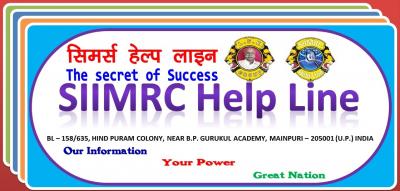
सिमर्स हेल्प लाइन
SIIMRC Help Line
यदि जीवन में लोकप्रिय होना हो तो सबसे ज्यादा ‘आप’ शब्द का, उसके बाद ‘हम’ शब्द का और सबसे कम ‘मैं’ शब्द का उपयोग करना चाहिए.

GS Future Plan
दुनिया में सबसे ज्यादा सपने तोड़े हैं इस बात ने, कि लोग क्या कहेंगे. अगर जिंदगी में सफल होना हैं तो पैसों को हमेशा जेब में रखना, दिमाग में नही
Training Vedios
M.D. Massage

प्रिय मित्रों,
सर एल० एस० के० ग्रुप व उसके द्वारा स्थापित विभिन्न संस्थानों एवं संचालित योजनाओं को सफल बनाने के लिए आप सभी का ह्रदय से आभार व्यक्त करते हुए मुक्षे अत्यन्त हर्ष हो रहा कि आप सभी ने इतने कम समय में सर एल० एस० के० ग्रुप को बुलंदियों पर पहुँचा दिया।
साथियों जैसा कि हमारे संस्थान का उद्देश्य हमेशा समाज के लिए उचित ज्ञान, कौशल, अनुशासन और पर्याप्त रूप से कुशल मानव शक्ति प्रदान करने का रहा है, हम आपको पूर्ण विश्वास दिलाते हैं कि आपके विश्वास को सदैव कायम रखते हुए, समाज के हितार्थ कार्य करते रहेंगे।
इंजी० आर० बाबू
प्रबंध निदेशक
सर एल० एस० के० ग्रुप
News Headline
HELP LINE
E-mail Id - sirlskgroup@gmail.com
Tollfree No. 1800-212-3695
Customer Support No. 9258-1446-40
REGISTERED OFFICE
Bl-158/635,
Hind Puram Colony,
Behind D.I.C. In Front of Park,
Near B.P. Gurukul Academy,
Mainpuri - 205001 (U.P.) – India
CONTECT FORM
* required
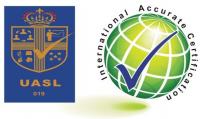
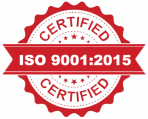



© 2025 All Rights Reserved with Sir L.S.K. Group, Mainpuri (U.P.) India Website Administrator - Er. R. Babu ǀ Powered By : BBREE Pvt. Ltd.

